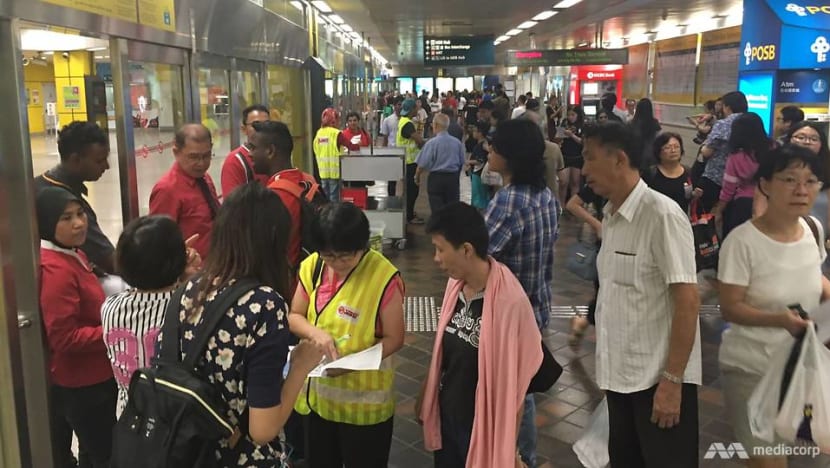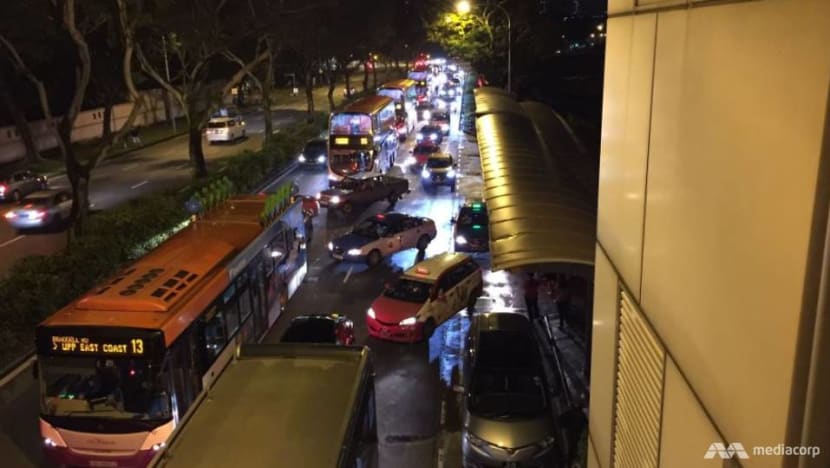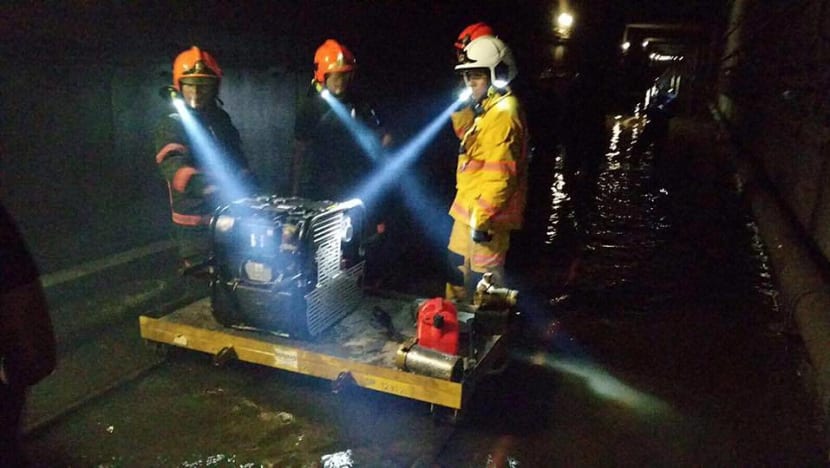commentary Singapore
Commentary: An inter-agency committee to deal with MRT tunnel flooding? This sounds familiar
Singapore has a penchant for forming taskforces and committees to deal with crisis and issues of national concern, but such solutions are not a cure-all, says a Lee Kuan Yew School of Public Policy observer.

The crowd at Toa Payoh MRT station on Oct 7 during the train disruption along the North-South Line caused by a flooded MRT tunnel.
SINGAPORE: In the wake of the MRT tunnel flooding between Bishan and Braddell stations in early October, Minister for Transport Khaw Boon Wan announced last week that a standing committee will be formed to regularly look into flood prevention for MRT tunnels.
This committee, jointly led by the Public Utilities Board (PUB) and the Land Transport Authority (LTA), will meet twice a year and submit an annual review of flood prevention measures to the Minister for Transport.
While it is still early days and further details on the PUB-LTA Standing Committee have yet to be fleshed out, my view is we must be careful not to make the response to set up a committee to deal with a national issue a default solution to any huge problem Singapore faces.
THE PROLIFERATION OF BUREAUCRACY
Management guru C Northcote Parkinson coined Parkinsonʼs Law which posits that work expands to fill the time available for its completion. In his book of the same name, he had a chapter devoted to “comitologyˮ ̶ the study of how committees, task forces and government agencies are created but eventually become irrelevant.
Parkinson was concerned with not just the proliferation of bureaucracy, but more importantly how futile an exercise it often is.
The Singapore Government has a penchant for forming high-level, high-signature committees as a first response to crises. Indeed, it has not just been committees but permanent agencies created to tackle emerging public policy problems.
For example, the Municipal Services Office was set up to deal with cross-cutting municipal issues that span many agencies, famously illustrated in the fishball stick story told in the Prime Minister’s 2014 National Day Rally speech. The Pioneer Generation Office was set up to help communicate the value of the Pioneer Generation Package and other schemes our Pioneers could access.
For the most part, such committees and agencies have delivered tangible results.
Within the economic domain, we have also seen the 1986 Economic Committee, the 2001 Economic Review Committee and 2009's Economic Strategies Committee make concrete and effective policy recommendations in the wake of the 1985 recession, the Asian Financial Crisis and the 2009 Global Financial Crisis respectively.
But it remains to be seen whether the responses from the latest Committee on the Future Economy will be able to power the Singapore economy and chart out its new frontiers.
The trouble also is that setting up the LTA-PUB Standing Committee so specifically to address tunnel flooding speaks to a reactionary and retrospective mindset. It seems to suggest the bias towards fighting the previous crisis, instead of preparing for the next likely one.

There is the risk of the “if all you have is a hammer, every problem looks like a nailˮ syndrome at work here. Having a committee so focused on tunnel floods potentially blinds agencies to other causes of MRT disruptions and delays.
Furthermore, it reveals how organisations are drawn to tackling only the extraordinary crisis.
The imagery of the October tunnel flood may have led to a sense of urgency in preventing the recurrence of such a visibly embarrassing incident. But on balance of probability and given recent history, MRT trains will likely be plagued by more mundane problems, such as the 30-minute delay arising from signaling, track faults or doors that will not close properly.
Such mundane problems call for an ongoing fix that we have become less adept at compared to the high-profile solution that takes the form of a sweeping reform or a newly established bureaucratic structure.
These days, we seem to be better at building things and standing up committees whereas the challenge lies in maintaining the transport systems we already have.
A WICKED PROBLEM
There has been some criticism that the resources of public agencies are being directed to ensuring that the operating of our MRT trains are not stymied by floods and the like, whereas the problem should be resolved by SMRT, a private train operator.
In this instance, I think it is actually right that the LTA-PUB Standing Committee look at the wicked problem of tunnel floods.
A wicked problem by definition is an issue that goes beyond the ability of any single organisation to solve on their own, and it is fortunate Singapore is able to marshal whole-of-government resources quickly to tackle such problems plaguing Singaporeans.
My criticism is that a more holistic and prospective approach should have been adopted rather than one so narrowly focused. This latest committee looks at tunnel floods, which is now a “known unknownˮ, a risk we are now aware of.
What is potentially more useful would be to develop and institutionalise a forward-looking, horizon-scanning capability to imagine and pre-empt risks that are “unknown unknownsˮ.

Letʼs also bear in mind that this serious incident of flooding was caused by a localised failure, a seemingly small cause.
Indeed, a key characteristic of a wicked problem is that a small cause can have a massive effect. And the proximate cause of the flooding was small: A pump, or more accurately the failure to inspect and maintain the pump.
Consequently, it seems all the good work that the committee can do, and all the systems that are put in place, can similarly be undone by micro failures - cultural and process failures - that occur on the train operatorsʼ end.
The effectiveness of this top-down structural solution, to say nothing of the committeeʼs KPI of preventing floods, is unfortunately contingent on fundamental mindset and cultural changes down in the trenches - or tunnels in this case.
Finally, there is clearly a symbolic aspect to this. The forming of the committee signals to the public that this issue is being taken seriously.
But the setting up of a committee cannot be the be-all and end-all; Effective results must be produced.
There is also the risk the public may suffer from task force/committee/engagement fatigue, and that if the state of our MRT system does not improve, a more cynical response about Singapore’s MRT system and public transport may grow.
Parkinson, who was also a naval historian during the decline of the British Empire post-World War II, had a front row seat to observe how the British colonial office expanded even as Britain's overseas empire shrank.
He explained this phenomenon in terms of two laws. One, a bureaucrat wants to multiply subordinates, not rivals. And two, bureaucrats make work for each other.
Beyond the immediacy of tunnel flood prevention, the broader point here is Singaporeʼs standard response to emerging problems cannot be the reflexive expansion of bureaucracy because the efficacy of bureaucratic solutions will plateau due to bloat and lock jam.
The recent MRT tunnel flooding incident and the delays and disruptions on the MRT Singaporeans are slowly getting used to are timely opportunities to rethink our long-standing, near-exclusive preference for dealing with national-level problems by responding with tangible, high-profile solutions, in this case, the penchant for setting up such committees.
Adrian W J Kuah is a senior research fellow at the Lee Kuan Yew School of Public Policy.












